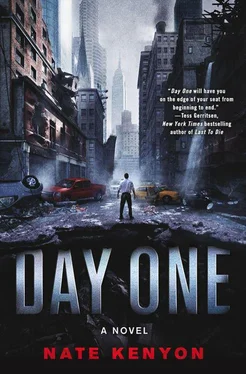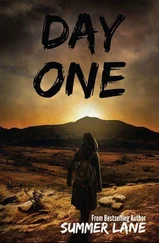Robin held his gaze and kept his hand in hers a moment longer than what might be necessary, her skin hot against his own.
“Anarchists frighten me,” she said, after they broke off from Brady and got drinks from the kitchen. “But then again, so do heights. And yet they make me tremble with excitement.” She glanced sideways at Hawke, and then down, a look he would later come to know very well. He caught a whiff of something light and summery as she leaned in, smiling: jasmine and cedar. “Will you make me tremble, Mr. Hawke?”
Hawke couldn’t tell if she was serious or not. It was Marilyn Monroe–style parody, but Robin played it well. She wore her curls up under a short blond wig and had a slender neck, a few fine, dark hairs escaping from where they’d been pinned.
My God, what a woman. He was out of his league and tongue-tied. “Nathan’s pulling your leg. We don’t want to end all government. We’re just interested in freedom of expression, and the power of the masses to bring the right kind of change. It’s about justice.”
“That a pretty noble idea, but not a very realistic one, is it?”
“Let the trembling commence.”
“I just mean it isn’t particularly feasible. It assumes the masses can agree on anything.”
“True democracy assumes that the majority can reach a consensus. We just try to create a space where that can happen. Technology gives us a vehicle to do that, in a way that’s never been possible before.”
“But how are you going to do that? Give everyone in America a voice?”
“We’re all free to join the movement, protest against the decisions we don’t like, make our opinions known—”
“But you can’t force people to do it. And let’s face it, most of them won’t. Most Americans will continue about their lives, working day shifts and going home to dinner with their families. So you’re faced with the same situation we’ve faced since the beginning of the civilized world—you’re part of a small group claiming to represent the opinions of everyone else.”
“It’s not like that,” Hawke said. He was beginning to get flushed, and she was so goddamn beautiful he couldn’t think straight. “We don’t represent anyone but ourselves, and that’s the whole point. Look, the imbalance of power is greater now than at any other time in our history. A handful of people hold the country’s wealth, while the rest work their fingers to the bone just to survive—”
“Have you ever heard of feudalism?” Robin said. She sipped her drink, watching his face, her long, delicate fingers wrapped around the glass.
“I’m talking about modern times here,” he said, his flush getting deeper. “Listen, what are you anyway, a historian?”
“Actually, yes. Working on my dissertation.” She smiled again, and her face was warm and open and kind; there was nothing confrontational in it, and he realized she’d been playing with him after all.
“You’re pretty serious, aren’t you?” she said. “I like a serious man. Someone who believes in their convictions, who has a vision of what they want. It’s sexy as hell. Let’s go have babies together and conquer the world.”
Goddamn it, Nathan. Hawke had to smile. Brady had known exactly what he was doing, introducing them. “Why don’t we start by getting out of here,” Hawke said, and Robin agreed. They slipped out before dinner even started without telling anyone, and he never spent a second regretting it.
In fact, it was the best decision he ever made.
8:59 A.M.
THE TV IN THE CONFERENCE ROOM FLICKERED and went to snow for a moment, and the lights dimmed. Like in my apartment earlier this morning, Hawke thought, memories of his wife drifting away and leaving him with a momentary ache. A faint smell wafted over the room, chemical and hot, and a buzzing filled the air and then faded as the fluorescents came back up.
“Did you see that?” a programmer named Bradbury, who had just entered the room asked. He was large enough to have rolls of fat around the back of his neck. He was looking up at the lights, as if the answer could be found there. But nothing else happened, and after a moment the broadcast came back on.
As Hawke slipped back to the desk where he’d set up his computer, still thinking of Robin, his cell vibrated. He dug it out to see a message response from Rick: No.
That was it, just the one word on Hawke’s screen. Rick had never been the type to go on and on about anything. But as angry as Rick was (“hurt” or “betrayed” might be more accurate), Hawke was surprised he’d responded at all, and that meant something.
The man was worried.
Hawke texted back: Log on in five. He sat down and opened his laptop. So, as far as Rick was concerned, Anonymous hadn’t been responsible for the attack on the Justice Department’s servers. Rick was deeper in the underground network than anyone, Hawke knew. But it was an amorphous entity, members and targets shifting constantly with no formal leadership structure, and although Hawke still trusted Rick with his life regardless of all that had happened between them, and although he knew Rick would be honest with him, that didn’t mean he was right.
The standard decoy message board was still online, cluttered with news items and press releases that chronicled the group’s latest targets and triumphs. It even had a log-in and special members area where people posted about ion cannons and argued about the merits of taking down Facebook. But that was all bullshit, a smoke screen, and the people posting there were wannabes and fringe elements. You had to dig past them to get to the core; there were layers of Anonymous so deep and so secret, even some of the veterans didn’t know they existed. It had to be this way, with federal investigators all over them.
Hawke quickly found the right thread with what appeared to be the ravings of a lunatic against big government. He got out his phone and launched a custom app that applied a filter to the phone’s camera, allowing him to see the public key encryption hidden in simple text against the white background underneath. He hadn’t visited the board in months, but the process was still the same, and he hoped the private key he had was still the right one.
Sure enough, the private key worked just fine. He copied the hidden URL, as well as a user name and password. The boards changed constantly, and user names and passwords were generated on the fly; they were good for one use only. Chat sessions within the network, if initiated, could only run for three minutes before the URL changed and new log-in credentials were required.
The latest private board was filled with threads that were already pages long, going on about something called Operation Global Blackout. It was supposed to be an organized attack over the next several days by Anonymous members on networks across the world to protest the latest copyright bill working its way through Congress. But here people seemed mostly confused, all of them claiming to have nothing to do with the attacks, including the one on the DOJ last night.
The fact was, someone had taken down the DOJ servers. If it wasn’t Anonymous, then who had done it?
Hawke scrolled through the threads quickly, his curiosity piqued. Most of the screen names he didn’t recognize; he’d been out of the game for a while now, and the shadowy hacker underground changed on a dime. Even their physical locations were suspect. Several of the most high-profile members over the last couple of years had turned out to be transients like Commander X using Internet cafés to take down the world’s most powerful and protected networks; one of the most famous had bounced from friends’ couches to abandoned warehouses and become a media star by invading the servers of the Times, Microsoft, and Yahoo! and later, after he was finally unmasked, becoming a security specialist working for a private firm with ties to U.S. government agencies.
Читать дальше












